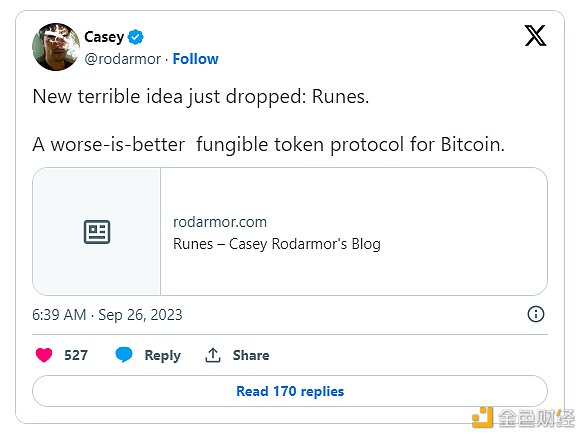Author: Brayden Lindrea, Cointelegraph; Translation: Song Xue, LianGuai
The inventor of the Bitcoin ordinal has proposed a new Bitcoin-based alternative token protocol as a potential alternative to the BRC-20 token standard.
The BRC-20 standard was launched by the anonymous developer “Domo” in March. Within two months, the market value of BRC-20 reached $1 billion, with PEPE and ORDI being among the most famous BRC-20 tokens created on Bitcoin.

- The post-Fading Passion Ordinals ecosystem An overview of the development status of various protocols
- Expert Discussion SBF’s possible sentence may be 10-20 years? Which charges will be established?
- The Last Throes of Leviathan How Will the World Be Decentralized?
BRC-20 allows for the minting and transfer of alternative tokens on Bitcoin through the Ordinals protocol. However, Rodarmor believes that the issue with BRC-20 tokens is that they occupy Bitcoin network resources through “garbage” unused transaction outputs or UTXOs.
In a post on September 25th, he explained that BRC-20 tokens have “adverse consequences of UTXO diffusion” and proposed Runes as an UTXO-based alternative.
“UTXO-based protocols are more naturally suited for Bitcoin and promote UTXO set minimization by avoiding the creation of ‘garbage’ UTXOs,” he said.
Rodarmor added, “If the protocol has a smaller on-chain footprint and encourages responsible UTXO management, it may reduce harm compared to existing protocols.”
UTXO represents the remaining amount of cryptocurrency in a wallet after completing a transaction, with the balance used for subsequent transactions and stored in the UTXO database.
The UTXO model of Bitcoin plays a role in making Bitcoin an auditable and transparent ledger by preventing double spending issues.
Rodarmor noted that other alternative token protocols on Bitcoin, such as “Really Good for Bitcoin,” “CounterLianGuairty,” and “Omni Layer,” also have their own issues.

Rodarmor’s summary of issues with existing alternative token protocols on Bitcoin, source: Casey Rodarmor.
LianGuai’s note:
Comparison of existing alternative token protocols on Bitcoin:
-
BRC-20: Not based on UTXO and quite complex as it requires the use of ordinal theory for certain operations.
-
RGB: Very complex, relies on off-chain data, has been under development for a long time but has not been adopted.
-
CounterLianGuairty: Requires native tokens for certain operations instead of being based on UTXO.
-
Omni Layer: Requires native tokens for certain operations instead of being based on UTXO.
-
Taproot Assets: Somewhat complex, relies on off-chain data.
While Rodarmor acknowledges that 99.9% of alternative tokens are filled with scams and meme coins, he believes that the right alternative token protocol can add value to the Bitcoin network:
“Creating a good substitute token protocol for Bitcoin could bring substantial transaction fee revenue, developer attention, and users to Bitcoin.”
In a Twitter conversation with The Ordinals Show co-host Trevor Owens on September 25th, Rodarmor stated that he had proposed the idea of Runes last week, but he was unsure if he would further pursue this idea.
Shortly after the phone call, Owens proposed providing $100,000 from the Bitcoin Frontier Fund to potential developers who can create and run Rune applications as a means to further the Rodarmor proposal.
Like what you're reading? Subscribe to our top stories.
We will continue to update Gambling Chain; if you have any questions or suggestions, please contact us!